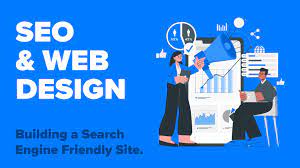
In today’s digital age, having a strong online presence is crucial for the success of any business. One of the key elements that contribute to a successful online presence is a well-designed website that is optimised for search engines (SEO).
Your website is often the first point of contact between your business and potential customers. A visually appealing and user-friendly website design can make a significant impact on how visitors perceive your brand. A well-designed website not only attracts visitors but also keeps them engaged, leading to higher conversion rates.
Key aspects of effective website design include intuitive navigation, responsive layout for mobile devices, fast loading times, and compelling visual elements that reflect your brand identity. A professional website design can help establish credibility and trust with your audience, setting you apart from competitors.
Search engine optimisation (SEO) plays a critical role in driving organic traffic to your website. By optimising your site’s content, structure, and technical elements according to search engine algorithms, you can improve your visibility in search engine results pages (SERPs). This increased visibility can lead to more qualified traffic and higher chances of converting visitors into customers.
Effective SEO services involve keyword research, on-page optimisation, link building, and regular performance monitoring and adjustments. By implementing SEO best practices, you can enhance your website’s ranking on search engines like Google, making it easier for potential customers to find you online.
Combining professional website design with strategic SEO services is essential for maximising your online success. A well-designed website that is optimised for search engines not only attracts more visitors but also converts them into loyal customers. Investing in website design and SEO services can give your business a competitive edge in the crowded digital landscape.
To enhance your website’s SEO performance, it is crucial to ensure that your website is mobile-friendly. With the increasing use of mobile devices for online browsing, search engines like Google prioritise mobile-responsive websites in their rankings. A mobile-friendly design not only provides a better user experience for visitors accessing your site on smartphones and tablets but also signals to search engines that your website is optimised for modern browsing habits. By making your website mobile-friendly, you can improve your SEO performance and reach a wider audience effectively.
Optimising your website’s loading speed is a crucial tip for enhancing both user experience and SEO ranking. A fast-loading website not only keeps visitors engaged and satisfied but also signals search engines that your site provides a positive user experience. By prioritising loading speed optimisation, you can reduce bounce rates, increase page views, and ultimately improve your search engine rankings. Investing in improving your website’s loading speed can have a significant impact on both user satisfaction and SEO performance, making it a key factor in the success of your online presence.
To maximise the effectiveness of your website design and SEO services, it is crucial to create high-quality, relevant content that incorporates targeted keywords strategically. By crafting content that is not only engaging and informative but also optimised for search engines through the inclusion of relevant keywords, you can enhance your website’s visibility and attract a more qualified audience. This approach not only improves your site’s ranking on search engine results pages but also establishes your authority in your industry, ultimately driving organic traffic and boosting conversions.
Utilising descriptive meta tags and headings is a fundamental tip in website design and SEO services. By incorporating relevant keywords and concise descriptions in meta tags and headings, you provide search engines with valuable information about the content of your website. This helps search engines understand the context and relevance of your web pages, ultimately improving your site’s visibility in search results. Effective use of meta tags and headings not only enhances search engine optimisation but also enhances user experience by guiding visitors to relevant sections of your website.
Optimising images on your website is a crucial aspect of effective SEO strategy. By using descriptive file names and adding relevant alt text to your images, you can improve your site’s visibility and accessibility for search engines. Search engines rely on file names and alt text to understand the content of images, so using appropriate keywords can help boost your website’s SEO performance. Ensuring that images are optimised not only enhances user experience but also contributes to higher search engine rankings, making it easier for potential customers to discover your website online.
To enhance both user experience and search engine optimisation (SEO) performance, it is advisable to incorporate internal links within your website. Internal linking not only helps users navigate your site more effectively by guiding them to relevant content but also boosts SEO by establishing a hierarchical structure and spreading link equity throughout your pages. By strategically placing internal links, you can improve the visibility of important pages, encourage visitors to explore more of your content, and signal to search engines the relevance and authority of your website.
Regularly monitoring and analysing your website’s performance using tools such as Google Analytics is a crucial step in enhancing your SEO strategy. By leveraging data-driven insights, you can identify areas for improvement, track the effectiveness of your SEO efforts, and make informed decisions to optimise your website for better search engine visibility. Continuous monitoring allows you to stay ahead of trends, understand user behaviour, and refine your strategies to ensure that your website remains competitive and relevant in the ever-evolving digital landscape.
To ensure the effectiveness of your website design and SEO services, it is crucial to stay informed about the latest SEO trends and algorithm changes. By staying updated, you can adapt your website design strategies to align with current best practices and algorithm requirements. This proactive approach not only helps improve your website’s search engine ranking but also ensures that your online presence remains competitive and relevant in an ever-evolving digital landscape.